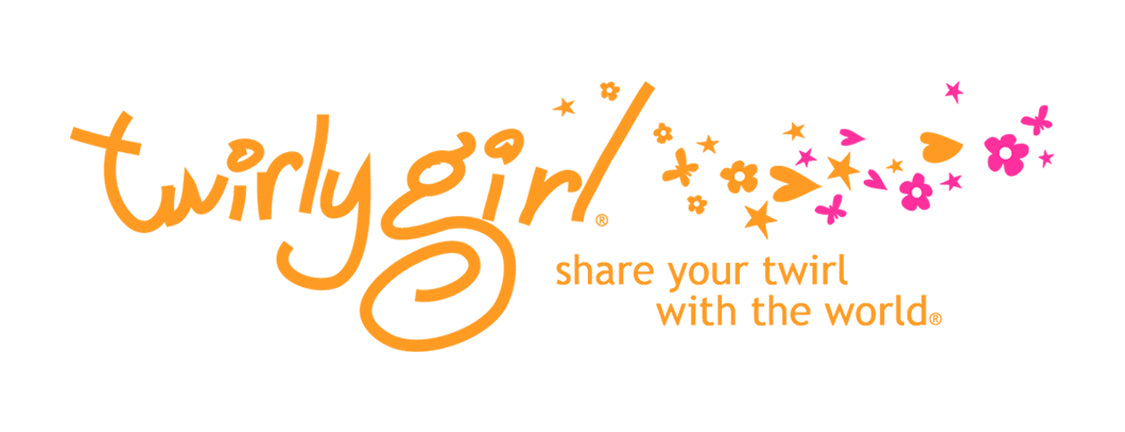Whether you're walking into a fabric store for a DIY project, or shopping for clothes, choosing the right fabric is never easy. It's especially tricky when shopping for young children and tweens, because they can be so particular about the way fabric feels against their skin. Here's a handy guide that will hopefully make things easier for you.
TwirlyGirl clothing uses the softest, high quality fabrics available. They are long-lasting, easy to wash, colorfast, stretchy, and best of all, perfect for twirling.
SHOP BY SIZE to everything we offer in the sizes you need.
Whenever you are choosing fabrics, the best way to know if they are going to be right is to first know what you need them to do. Do they need to move with you, or create a very defined silhouette? Do they need to be handled in a special way to clean, or can you throw in the washing machine? Are you traveling, going to a special event, or need something fun for every day wear? All of these factors will come into play with the fabrics you choose.


Cotton comes from the cotton plant. It's easy to clean, and comfortable. Unfortunately, it can stretch out and loses it's shape. It's also susceptible to wearing out over time.

Denim comes from cotton fabric that has been woven in such a way as to produce a diagonal ribbing. Very stiff and sturdy. The name is derived from the French, "serge de Nimes" which refers to the city of "Nimes." Fades and wears well, which is why it's so widely used in jeans.

Flannel is lightweight and soft. Great for cold weather garments. Often made from wool, cotton, or synthetic fiber. Can be brushed to make it softer. Very popular during the grunge rock era of the 1990s.

Hemp is made from the stem of the marijuana plant, but does not contain narcotics. It's texture is similar to linen, does well with water, but has a tendency to wrinkle.

Linen is a lightweight fabric that breaths well in hot weather. Can look both casual and neat. It's a natural fiber that comes from the flax plant... same place where flax seeds come from. The downside is that it wrinkles very easily and requires gentle washing.

Nylon was invented as a synthetic replacement for silk, it was used in WW2 to make parachutes and tires. It was also used instead of silk to make women's stockings, which is where the term "nylons" originated. Nylon is strong and inexpensive and is easily washed.

Polyester tends to be very comfortable. It washes well and doesn't require special care. We tend to use many polyester blend knits because they take color extremely well, they're durable, and the dyes don't fade. Because polyester blends are man-made, they don't breath as well as cotton. However, for a twirly dress, that doesn't really matter. There's plenty of room for air to go in an out, and given the softness and durability, it really is the ideal fabric. Today's polyester blends have come a long way from the polyester leisure suits of the 1970s. Rejoice!

Satin can be lightweight or heavy weight. It tends to be glossy in appearance and is smooth, silky, and flowy.
Silk has been around since ancient China. It's incredibly smooth and lustrous, and comes from the cocoon of the mulberry moth. It's very lightweight, flowy and, of course, silky! Ideal for draping and lining.

Remember the 90s? Spandex, also known as lycra, is a synthetic fabric that stretches well. It's perfect for exercise clothes, but because it is skin tight, it hides nothing. Today, it's also used in skinny jeans to make them form fitting. It's also used in polyester blend knits to make them more stretchy.

Rayon comes from cellulose fibre. It drapes well because it is lightweight, but still heavier than cotton. Rayon is manufactured fabric from natural fibers. This makes it part natural, and part synthetic. It is often used to mimic the feel of silk, wool, and linen. It's soft, comfortable and smooth. Rayon is idea for hot and humid climates because it doesn't insulate body heat. The downside is that it requires careful washing and is not very durable.

Wool comes from sheep and goat hair. It's very warm, but can also be itchy. Mohair is a variation of wool that comes from Angora goats.
